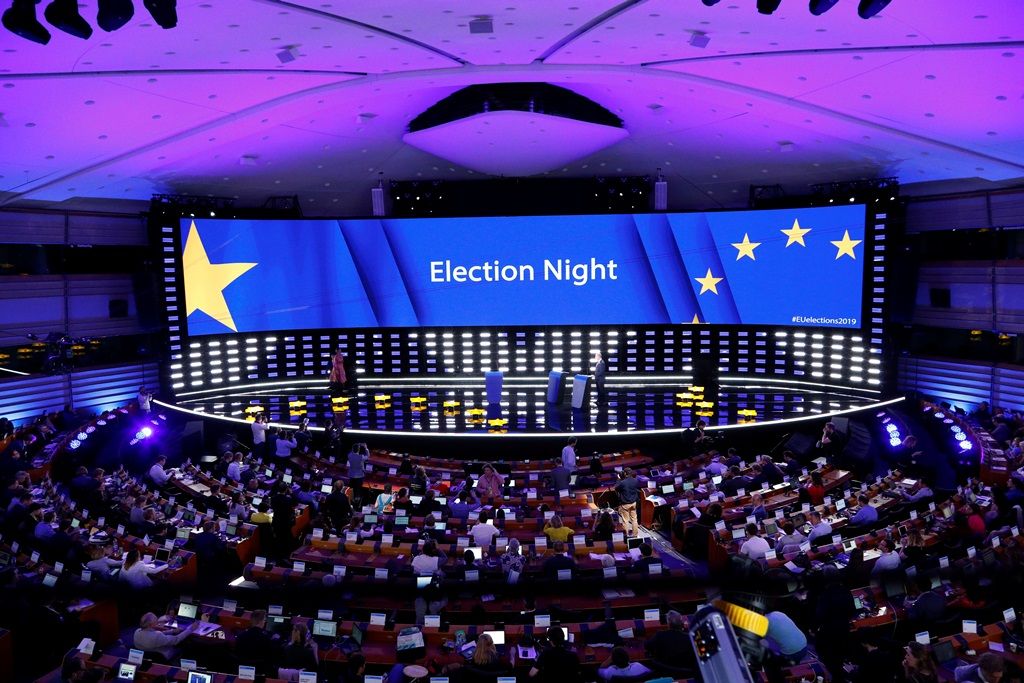Potential Changes in the European Parliament after the 2019 Elections

The EP elections are in May 2019. Political parties now dominant in the chamber will fight to maintain their position against new movements and those that until recently had played only supporting roles, both Eurosceptic ones and others with a strongly pro-European character.
The Socio-Political Context
The last two years have brought significant change in the balance of power between the political parties in the largest EU Member States. In France, President Emmanuel Macron’s party, advocating political renewal of the national scene and a significant deepening of European integration, has become a major force. In Spain, the Ciudadanos party, which, like Macron’s movement is trying to capitalise on the distrust of political elites, leads the polls. Critics of the EU have achieved some spectacular success as well. After the elections in Italy, the new government was created by the anti-system Five Star Movement and the right-wing League, which usually played the role of the junior coalition partner of the party Forza Italia. In Germany, the party Alternative for Germany, which has called for leaving the eurozone, became the third force in the Bundestag. In Austria, the Eurosceptic Freedom Party is a member of the ruling coalition.
Although this next part does not apply equally to all Member States, it seems that the socio-political context conducive to rhetoric critical of integration is slowly beginning to subside. A general economic recovery, significantly fewer migrants and refugees coming to Europe, and the remaining Member States’ unity on Brexit strengthen the image of a Union that is overcoming a multidimensional crisis. This diagnosis is confirmed in the polls. The Eurobarometer published in May and June this year shows moderate improvement in the public’s assessment of the economic situation and the overall condition of the European Union. Of the respondents, 67% said they believe that their country benefits from EU membership, the best result since 1983. The concerns about immigration and terrorism, widely considered to be among the key factors in the upsurge in support for Eurosceptics, are diminishing.
Strengthened Liberals
The rising support for new movements means that the position of the two European political parties dominant in the chamber—the EPP, with 29% of the seats, and S&D, with 25% of the seats—is threatened. This applies above all to the centre-left, which in 2017 suffered defeats in elections in France and Germany, and a year later, in Italy. After Brexit, S&D will lose an important member party—Labour, which currently constitutes 10% of the group’s membership. Moreover, they will have to face increasing competition from left-wing parties. In some countries, those parties have gained support comparable (in Spain) or larger (in France) than that enjoyed by S&D members.
Surveys also reveal that the main EPP member parties (the Republicans in France, Civic Platform in Poland, and Forza Italia) have to expect a worse result than in previous elections. Besides the polls, the EPP face internal problems. Hungarian Prime Minister Viktor Orbán, whose Fidesz party belongs to the group, criticised it as too frequently forming alliances with the left and threatened to create a competitive pact with parties opposing the admission of migrants. Such a coalition could attract MEPs from the Group of European Conservatives and Reformers, which, after Brexit, will be seriously weakened: British Conservatives make up 26% of its members. Parting ways with the largest political group in the EP could, however, contribute to worsening Hungary’s conflict with EU institutions. For the EPP, the departure of Orban’s party, or its possible exclusion from the group, could entail not only the loss of a dozen Hungarian MPs but also aggravate internal disputes, since not all of the party delegations are equally critical of the Hungarian prime minister. It seems, therefore, that Fidesz’s increasingly complicated cooperation with the EPP will continue.
For the French president, the European elections will be an opportunity to gain more clout. After winning the presidential and parliamentary elections, Macron himself has not decided to join one of the European parties, cultivating the image of a politician that has outgrown old political divisions. However, winning influence over EP decisions will require building alliances. Declarations by members of the president’s party suggest that Macron is considering joining the liberal group (Alliance of Liberals and Democrats for Europe, or ALDE, which has 9% of the seats in the EP) or, with the support of some liberals, creating a new group, one that is centrist and pro-integration. The many similarities between Macron’s vision of the EU’s future and the ideas advocated by the leader of the liberals, Guy Verhofstadt, suggest that such an alliance is likely. An important partner in the group could be Ciudadanos. If the French president’s party achieves a good result in the 2019 elections (it remains the leader in the polls with support around 24-27%), then strikes a deal with the liberals and possibly attracts several new parties, a “Macronian” group might become an important third force in the EP, and if the S&D has a poor showing, perhaps even the second.
Eurosceptics’ Prospects
Eurosceptic parties will contest the 2019 elections strengthened by success in recent years. In some countries (such as Germany), the good results for the movement will probably be repeated. There are, however, several reasons apart from the improvement in the public mood to claim that the Eurosceptic contingent in the chamber will not become significantly larger. First, Brexit will mean the disappearance of about 20 or so British MEPs who are critics of the Union. Moreover, several Eurosceptic parties, such as the French National Rally (formerly National Front), already have a large representation in the EP and further growth is unlikely, according to polls. Finally, if the Eurosceptics in power in Italy fail to fulfil their costly campaign promises, they may find it difficult to repeat their electoral feats.
The more restrained rhetoric used recently by the Eurosceptics in France and Italy, above all in relation to membership in the euro area, suggests that in the coming campaign they will try to persuade moderate voters to their side. This approach may make it easier to build an alliance with conservative parties, which focus their criticism of the EU on migration-related issues.
Conclusions
The campaign ahead of the European elections will be not only a clash between the supporters and opponents of integration but also a confrontation between the parties that have traditionally dominated the political scene and movements that have managed to challenge this domination in recent years.
The outcome of the elections may shift the balance of power between the political groups: the dominance of the EPP-S&D duopoly could give way to a triumvirate of the EPP, the liberals, and S&D. This configuration would strengthen the liberals, who would then play a decisive role when splits appear between the left and the right, even more than they do today. It could also boost the influence of the French president, whose party has a chance to become the largest delegation in the liberal group.
The essence of the political process in the EP will remain the same and will be based on the creation of broad compromises between the representatives of the three groups. Only decisions agreed amongst them stand a chance of quick acceptance by the EU Council, also dominated by representatives of these three political families.
Eurosceptics will probably have a larger representation in the chamber, especially if several conservative parties join the group, but it still will not be large enough to fill important parliamentary positions or win votes. The EP is likely to remain an institution consistently advocating closer integration.





